|
|
|
Sort Order |
|
|
|
Items / Page
|
|
|
|
|
|
|
| Srl | Item |
| 1 |
ID:
169772


|
|
|
|
|
| Summary/Abstract |
The unfair distribution of public sector jobs is a common grievance in many societies, but arguably more so in ethnically polarized ones. Using census data from Kenya and Uganda, two countries with a history of ethnic conflict, this article examines how public employment is allocated in multi-ethnic societies by studying the correlates of holding public sector jobs. The results demonstrate that the public services of Kenya and Uganda are first and foremost comprised of educational elites with considerably higher average levels of educational attainment than across the labour forces at large. However, when education is controlled for, high-skilled women and candidates from less developed districts are more likely to work for the state than others. As a result, public sector jobs are more equitably distributed along gender, regional and ethnic lines than education alone would predict. I hypothesize that formal policies to promote regional equity in the provision of basic services in combination with affirmative action measures are contributing to creating comparatively inclusive public services.
|
|
|
|
|
|
|
|
|
|
|
|
|
|
|
|
| 2 |
ID:
159545
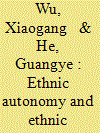

|
|
|
|
|
| Summary/Abstract |
To balance ethnocultural diversity with national integration, the Chinese government started formulating a series of ethnic policies in the early 1950s, including policies on identifying and classifying ethnic groups, a system of regional ethnic autonomy, and a set of preferential treatment policies toward 55 minorities. This article aims to examine socioeconomic disparities between ethnic minorities and the Han majority in China, focusing on the role played by regional ethnic autonomy. Based on a large sample of China's mini-census data collected in 2005, we show that among nonfarm working populations, minorities are more likely than the Han to become managers/professionals or obtain high-status occupation, regardless of whether they are living in their own autonomous jurisdiction or other places. Minorities are paid lower wages, however, even after controlling for other characteristics, and the gap is even wider in autonomous jurisdictions than elsewhere. Finally, children of mixed Han-minority marriages in ethnic autonomous jurisdictions are more likely to identify themselves as minorities, especially those holding urban registration status (hukou) whose parents have received more schooling. Our findings bear important implications for the current debate on ethnic policy in China.
|
|
|
|
|
|
|
|
|
|
|
|
|
|
|
|
| 3 |
ID:
139921
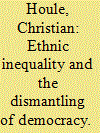

|
|
|
|
|
| Summary/Abstract |
Does inequality between ethnic groups destabilize democracies? While the literature largely agrees that inequality harms democracies, previous studies typically focus on the overall level of inequality in a society, leaving unanswered questions about the effect of inequality between ethnic groups. This article fills this gap and argues that inequality between ethnic groups harms the consolidation of democracy but that its effect is strongest when inequality within groups is low. Using group- and country-level data from more than seventy-one democracies and 241 ethnic groups worldwide, the author conducts the first cross-national test to date of the effect of ethnic inequality on transitions away from democracy. Results provide support for the hypothesis: when within-ethnic-group inequality (WGI) is low, between-ethnic-group inequality (BGI) harms democracy, but when WGI is high, BGI has no discernable effect.
|
|
|
|
|
|
|
|
|
|
|
|
|
|
|
|
| 4 |
ID:
146463
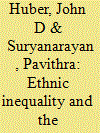

|
|
|
|
|
| Contents |
Why does ethnicity become a salient element of electoral politics in some places but not others? The authors argue that in majoritarian systems, ethnic identity is most salient to electoral behavior when there are high levels of inequality between ethnic groups. Theytest this argument in the Indian states and find that state-level party system ethnification is strongly correlated with economic inequality between groups, a pattern they also find in cross-national data. Theyalso show that in India, when income differences between groups increase, the groups tend to support different parties. The analysis reveals a strong class component to ethnic politics in India, underscoring the possibility that what scholars often view as identity politics can have an element of class politics in disguise.
|
|
|
|
|
|
|
|
|
|
|
|
|
|
|
|
| 5 |
ID:
179862
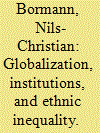

|
|
|
|
|
| Summary/Abstract |
Recent research has shown that inequality between ethnic groups is strongly driven by politics, where powerful groups and elites channel the state's resources toward their constituencies. Most of the existing literature assumes that these politically induced inequalities are static and rarely change over time. We challenge this claim and argue that economic globalization and domestic institutions interact in shaping inequality between groups. In weakly institutionalized states, gains from trade primarily accrue to political insiders and their co-ethnics. By contrast, politically excluded groups gain ground where a capable and meritocratic state apparatus governs trade liberalization. Using nighttime luminosity data from 1992 to 2012 and a global sample of ethnic groups, we show that the gap between politically marginalized groups and their included counterparts has narrowed over time while economic globalization progressed at a steady pace. Our quantitative analysis and four qualitative case narratives show, however, that increasing trade openness is associated with economic gains accruing to excluded groups in only institutionally strong states, as predicted by our theoretical argument. In contrast, the economic gap between ethnopolitical insiders and outsiders remains constant or even widens in weakly institutionalized countries.
|
|
|
|
|
|
|
|
|
|
|
|
|
|
|
|
| 6 |
ID:
112440
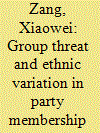

|
|
|
|
|
| Publication |
2012.
|
| Summary/Abstract |
Many scholars have examined how human capital, geography, etc. have shaped patterns of ethnic inequality in China. This paper studies the role the state plays in producing inter-group disparities in China. It discusses the link between the state and minority threat and explains how the linkage produces ethnic variation in entry into the Chinese Communist Party. Data are drawn from two surveys (N = 3,619) on Han Chinese, Hui, and Uyghurs conducted in two Chinese cities in 2001. Controlling for background characteristics removes the Han-Uyghur difference in CCP membership attainment. In contrast, no similar patterns are found when Han Chinese are compared with Hui. This contrast is explained with reference to state reaction to ethnic variation in perceived group threat.
|
|
|
|
|
|
|
|
|
|
|
|
|
|
|
|
|
|
|
|
|